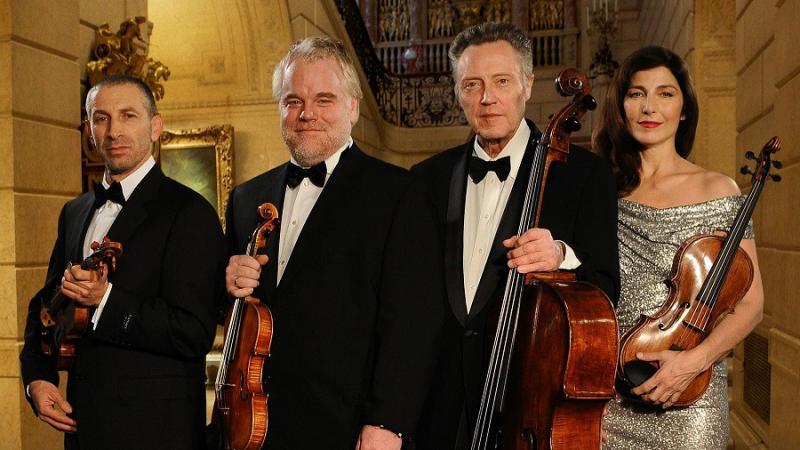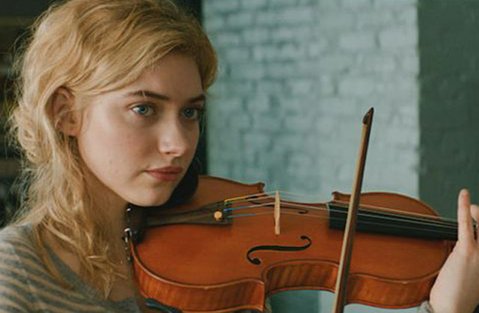A Late Quartet | reviews, news & interviews
A Late Quartet
A Late Quartet
A stellar foursome plays Beethoven in a chamber piece about actual chamber music

Two’s company, three’s a crowd, four’s a string quartet. Classical music movies tend to focus on the cost of individual brilliance. See David Helfgott in Shine, Jacqueline du Pré in Hilary and Jackie, not forgetting the talented little man who features in Amadeus. A Late Quartet homes in on that subtle and complex quadratic equation, a string ensemble which thrives on the interplay of four barely subordinated egos.
The Fugue String Quartet is all set to celebrate its 25th anniversary in New York when its cellist and senior member Peter (Christopher Walken) announces that after one last performance of Beethoven’s Opus 131 he is stepping away. Diagnosed with early-stage Parkinson’s, his fingers can no longer be relied upon to obey orders. The news soon shifts the tectonic plates under the remaining trio. Second violin Robert (Philip Seymour Hoffman) suddenly develops a yearning to share the first violin duties with Daniel (Mark Ivanir), a fiddle anorak and raging obsessive who unsurprisingly is loath to budge up.
 Then there is the violist Juliette, who also happens to be Robert’s wife, Daniel’s former lover and Peter’s surrogate daughter. Having failed to extract a declaration of loyalty, Robert introduces further dissonance by stroppily bedding a foxy flamenco dancer of his acquaintance (Liraz Charhi). A fifth element complicates the quartet’s internal dynamics still further in the shape of Robert and Juliette’s rebellious daughter Alexandra (Imogen Poots, pictured right). A student violinist, she is advised by her father to find more colours in her playing by unleashing her passion. She takes him at his word and soon lets lessons with Daniel progress to an affair. It’s only a matter of time before the fist on the end of the second violin’s bowing arm is heading for the first violin’s stubbly jaw.
Then there is the violist Juliette, who also happens to be Robert’s wife, Daniel’s former lover and Peter’s surrogate daughter. Having failed to extract a declaration of loyalty, Robert introduces further dissonance by stroppily bedding a foxy flamenco dancer of his acquaintance (Liraz Charhi). A fifth element complicates the quartet’s internal dynamics still further in the shape of Robert and Juliette’s rebellious daughter Alexandra (Imogen Poots, pictured right). A student violinist, she is advised by her father to find more colours in her playing by unleashing her passion. She takes him at his word and soon lets lessons with Daniel progress to an affair. It’s only a matter of time before the fist on the end of the second violin’s bowing arm is heading for the first violin’s stubbly jaw.
As the poet said, untune that string and hark what discord follows. Actually it’s another poet whose words underscore the internal strife of the Fugue Quartet - the unredeemable past and eternal present invoked in TS Eliot’s "Burnt Norton". It’s worth noting that this intense study of mature artistry is the directorial debut of Yaron Zilberman, who co-wrote the script with Seth Grossman. The other character is of course Beethoven’s last quartet, which spreads a hypnotic pall of searching melancholy.
Although the music is performed by the Brentano String Quartet, the quartet of actors make a presentable stab of looking like professional string players. Walken grapples with his cello in the style of Hemingway’s old man reeling in a marlin while simultaneously snacking on a wasp, but that could be deliberate. There’s no picking holes in the acting, of course, even if the tears trickle out of Poots’ conflicted neophyte a little too showily. Light relief is supplied by Wallace Shawn as the rival leader of a string trio, and Anne-Sofie Von Otter has a swift cameo as the ghost of Peter’s late wife.
“You have to be heartbroken to play Op 131,” the pedagogic Peter tells his students. He doesn’t say how. The film opens in that pregnant moment before a performance commences, then returns to it at the end to see what happens next. Even if you know how the interior dialogue of the Beethoven goes, the drama is in how it impacts on this quartet as they play it for the last time. Films are often compared to chamber pieces. In this moving instance, for once no comparison is necessary.
Watch the trailer for A Late Quartet
The future of Arts Journalism
You can stop theartsdesk.com closing!
We urgently need financing to survive. Our fundraising drive has thus far raised £49,000 but we need to reach £100,000 or we will be forced to close. Please contribute here: https://gofund.me/c3f6033d
And if you can forward this information to anyone who might assist, we’d be grateful.

Subscribe to theartsdesk.com
Thank you for continuing to read our work on theartsdesk.com. For unlimited access to every article in its entirety, including our archive of more than 15,000 pieces, we're asking for £5 per month or £40 per year. We feel it's a very good deal, and hope you do too.
To take a subscription now simply click here.
And if you're looking for that extra gift for a friend or family member, why not treat them to a theartsdesk.com gift subscription?
more Film
 theartsdesk Q&A: Idris Elba on playing a US President faced with a missile crisis in 'A House of Dynamite'
The star talks about Presidential decision-making when millions of lives are imperilled
theartsdesk Q&A: Idris Elba on playing a US President faced with a missile crisis in 'A House of Dynamite'
The star talks about Presidential decision-making when millions of lives are imperilled
 Urchin review - superb homeless drama
Frank Dillane gives a star-making turn in Harris Dickinson’s impressive directorial debut
Urchin review - superb homeless drama
Frank Dillane gives a star-making turn in Harris Dickinson’s impressive directorial debut
 Mr Blake at Your Service review - John Malkovich in unlikely role as an English butler
Weird comedy directed by novelist Gilles Legardinier
Mr Blake at Your Service review - John Malkovich in unlikely role as an English butler
Weird comedy directed by novelist Gilles Legardinier
 Don't Let's Go to the Dogs Tonight review - vivid adaptation of a memoir about a Rhodesian childhood
Embeth Davidtz delivers an impressive directing debut and an exceptional child star
Don't Let's Go to the Dogs Tonight review - vivid adaptation of a memoir about a Rhodesian childhood
Embeth Davidtz delivers an impressive directing debut and an exceptional child star
 One Battle After Another review - Paul Thomas Anderson satirises America's culture wars
Leonardo DiCaprio, Teyana Taylor, and Sean Penn star in a rollercoasting political thriller
One Battle After Another review - Paul Thomas Anderson satirises America's culture wars
Leonardo DiCaprio, Teyana Taylor, and Sean Penn star in a rollercoasting political thriller
 Steve review - educator in crisis
Cillian Murphy excels as a troubled headmaster working with delinquent boys
Steve review - educator in crisis
Cillian Murphy excels as a troubled headmaster working with delinquent boys
 Can I get a Witness? review - time to die before you get old
Ann Marie Fleming directs Sandra Oh in dystopian fantasy that fails to ignite
Can I get a Witness? review - time to die before you get old
Ann Marie Fleming directs Sandra Oh in dystopian fantasy that fails to ignite
 Happyend review - the kids are never alright
In this futuristic blackboard jungle everything is a bit too manicured
Happyend review - the kids are never alright
In this futuristic blackboard jungle everything is a bit too manicured
 Robert Redford (1936-2025)
The star was more admired within the screen trade than by the critics
Robert Redford (1936-2025)
The star was more admired within the screen trade than by the critics
 Blu-ray: The Sons of Great Bear
DEFA's first 'Red Western': a revisionist take on colonial expansion
Blu-ray: The Sons of Great Bear
DEFA's first 'Red Western': a revisionist take on colonial expansion

Add comment